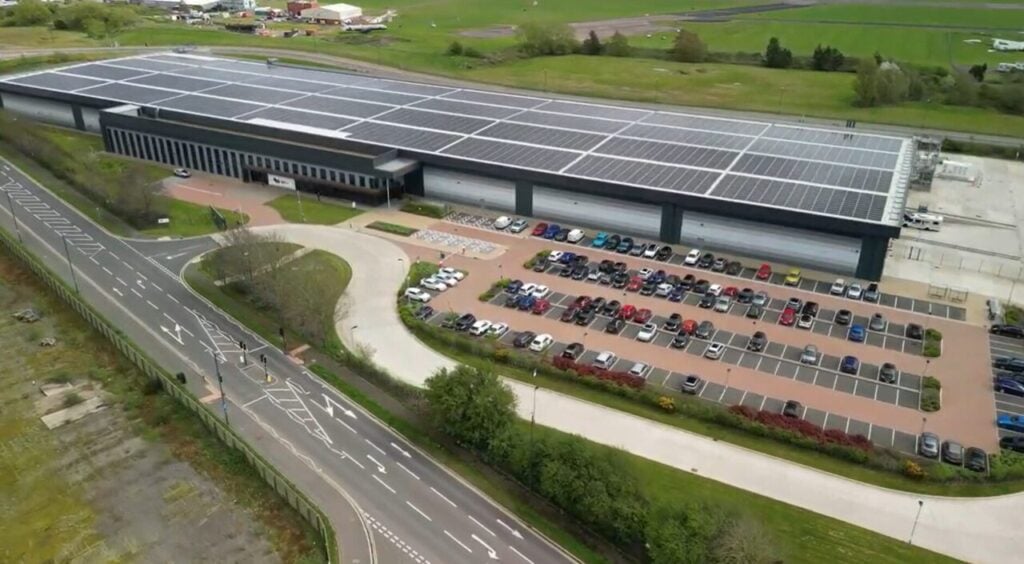
We hear from startup Volklec which, like another new European battery company Elinor, will build its batteries with a Chinese technology and manufacturing partner. They both say this will get around the challenges that ultimately doomed Europe’s first wave of battery startups, with Northvolt today declaring bankruptcy in Sweden.
UK battery startup Volklec’s CEO Phil Popham was talking to Energy-Storage.news as the firm emerged from stealth with the announcement two weeks ago (27 February) that it will manufacture lithium-ion, nickel manganese cobalt (NMC) 21700 cylindrical cells at the UK Battery Industrialisation Centre (UKBIC) in Coventry, England.
Enjoy 12 months of exclusive analysis
- Regular insight and analysis of the industry’s biggest developments
- In-depth interviews with the industry’s leading figures
- Annual digital subscription to the PV Tech Power journal
- Discounts on Solar Media’s portfolio of events, in-person and virtual
Volklec’s manufacturing will be done via an exclusive license agreement with China-based Far East Battery (FEB), which Volklec said is a market leader in the design and manufacture of batteries.
The UKBIC production line will get the firm to 1.1GWh of UK production capacity, which Popham said can be supplemented with imports from China, and plans much further down the line for a standalone Volklec 10GWh gigafactory in the UK.
As Energy-Storage.news sat down to write this interview up today (12 March), Northvolt filed for bankruptcy in Sweden (having already filed for Chapter 11 bankruptcy protection in the US) which appears to all but put an end to what has been by far Europe’s most funded battery company. For reaction to the news, see its LinkedIn post here.
‘Battery industrialisation is not easy’
Our interview pre-dated Northvolt’s latest announcement, but Popham was clear about why he saw the European independent battery industry—i.e. those not tied to a vehicle OEM—as having failed to-date.
“A lot of the battery independents across Europe have failed, I think mainly because it’s a long process, it’s an expensive process and many of them were trying to create their own chemistry, their own mechanical engineering around the design of the format, building a gigafactory, setting up their own supply base, getting long term funding of hundreds of millions, if not billions, over a long period of time,” he said.
“And all of them, for various reasons, have failed to come to fruition, and that proved industrialisation is not an easy challenge.”
He said that Volklec’s approach to use existing technology IP from China—and manufacturing if it needs to—mitigates the challenges around time, risk and investment needed to get the products to market.
FEB engineers will come to the UK to help Volklec ramp up production and get to a good yield, and Volklec also gets access to its supply chain.
The first product will be an energy cell for personal e-mobility and battery-integrated EV charging, which is already manufactured at scale by FEB, while a power cell for more niche applications like drones and specialist automotive is being developed. The energy cell will go into production in Coventry later this year and Volklec can also import the same battery cell from China.
Popham said he expects Volklec’s UK-manufactured cells to be cost-competitive, thanks to its access to FEB’s supply chain and the high yield. He plans to target the battery energy storage system (BESS) segment in future.
Popham spent 14 years at Jaguar Land Rover (JLR), the automotive group which is one of the only two companies building battery manufacturing capacity at scale in the UK (it is owned by Indian conglomerate Tata), with a 40GWh facility under construction in Somerset. Japanese firm AESC is the other.
Can you create new battery manufacturing in Europe without Chinese help?
The point of the benefits of getting to market now via partnering with Chinese companies rather than spending years trying to scale up manufacturing in Europe with your own technology was also made by Arne Fredrik Lanke, CEO of Norway-based Elinor Batteries, speaking to us at the Energy Storage Summit EU 2025 in London last month.
Elinor had just then announced plans to bring a 7.2MWh battery energy storage systems (BESS) to market with a proprietary battery cell manufactured in partnership with another Chinese company, Morlus Technology. That will be manufactured by Morlus in China, and Elinor aims to make a final investment decision this year on plans to bring production to Norway, with hopes to manufacture both batteries and BESS in Europe.
Norway has been the source of numerous independent battery startups, partially thanks to its abundant clean hydropower meaning cheap and green manufacturing. Morrow Batteries is one, but the more high-profile case of Freyr and its failure to launch manufacturing in Europe with new, semi-solid battery technology speaks to what Popham and Lanke have been talking about.
The political will to build up a European battery industry is still clearly there with the EU’s new €100 billion Clean Industrial Deal promising both support and incentives for its clean energy manufacturing industry (though note that neither the UK nor Norway are in the EU).
The will amongst buyers of clean energy technology, and the premiums they would pay for European-made products, is less clear however. Freyr and Northvolt are far from the only European companies building gigafactories, so their fates do not speak for the whole industry, but they were the most visible.
CALB the latest player from China to set up European gigafactory
Europe’s gigafactory projects are being pursued by a mix of independents like Volklec and Elinor, OEM-tied companies like Verkor and ACC, and existing players from China and East Asia setting up their own facilities.
Just recently CALB, the fourth-largest lithium-ion manufacturer globally according to market intelligence outlet Rho Motion, said it would invest €2 billion in a gigafactory in Portugal for 2027/28 production. LG Energy Solution and CATL, numbers three and one, are already building or running gigafactories in Europe while BYD, number two, said recently it was considering doing so as well.

